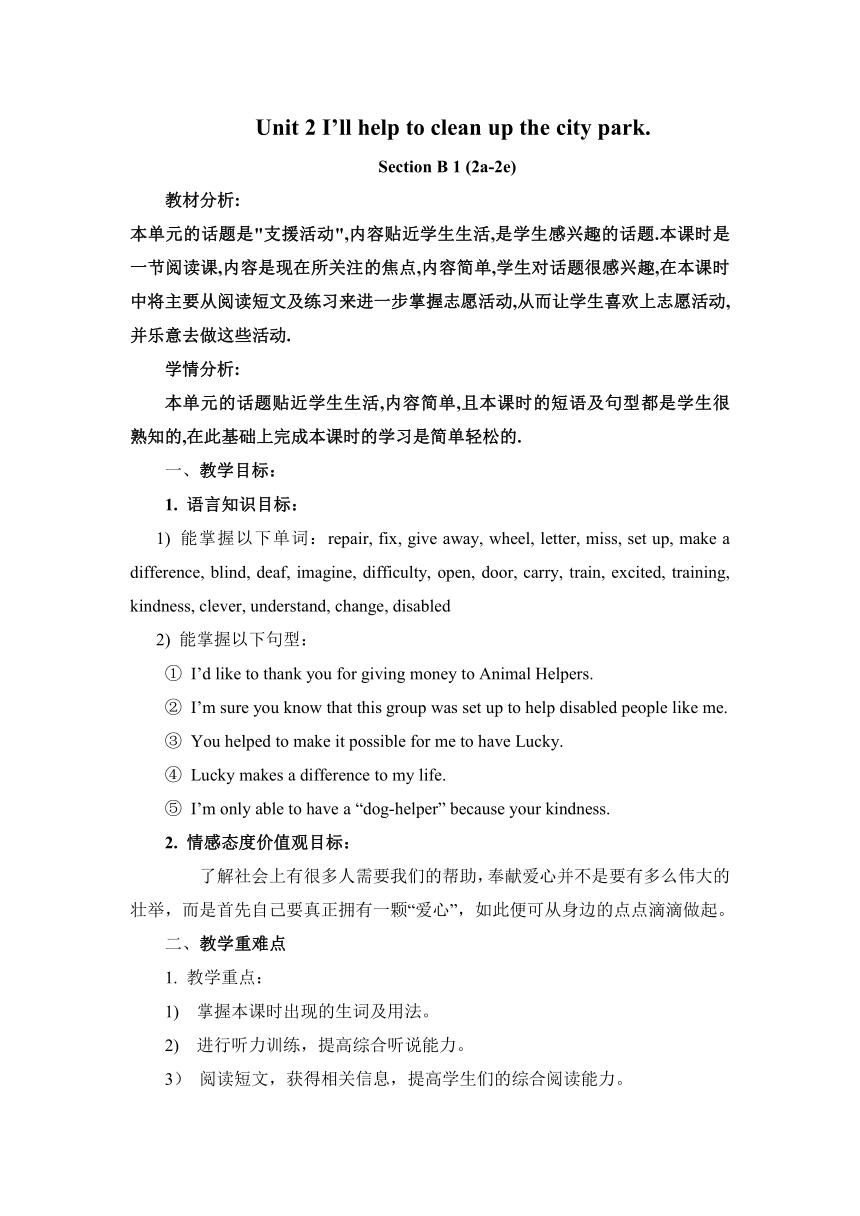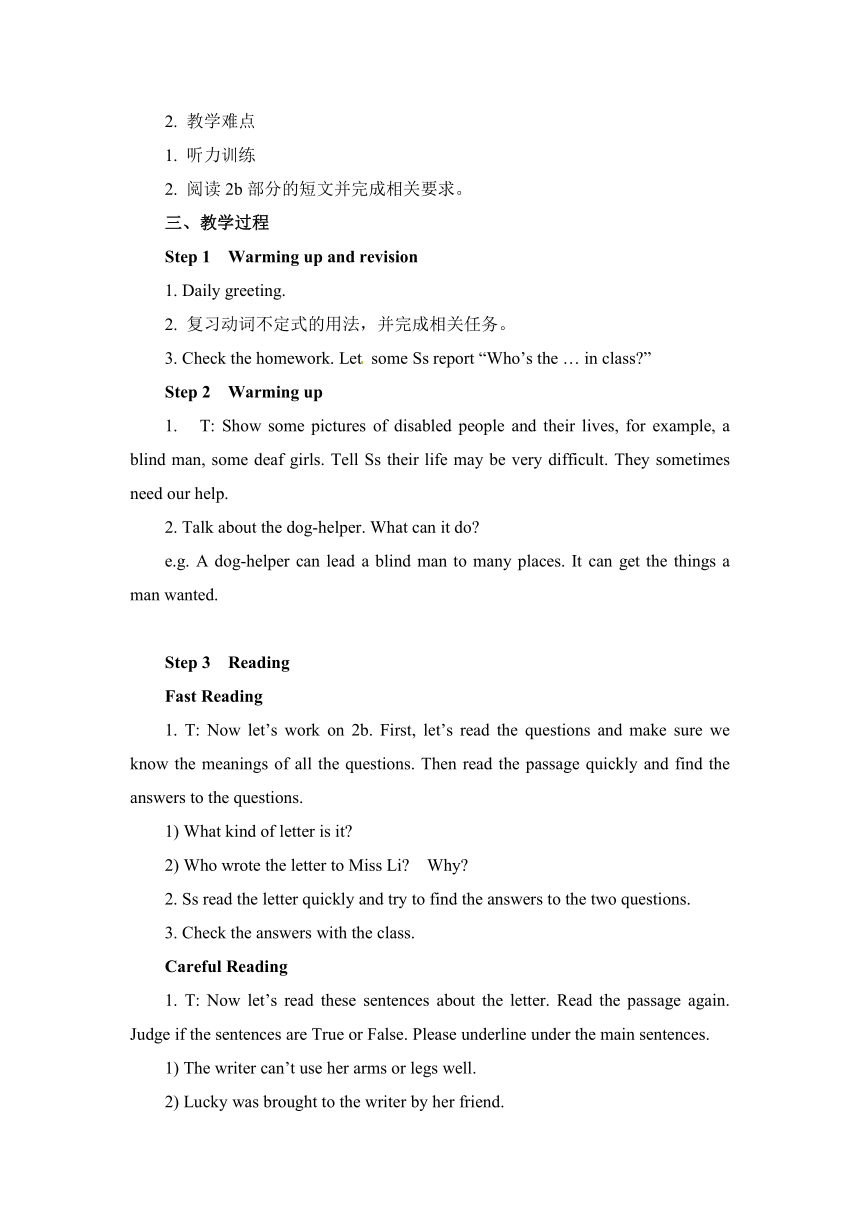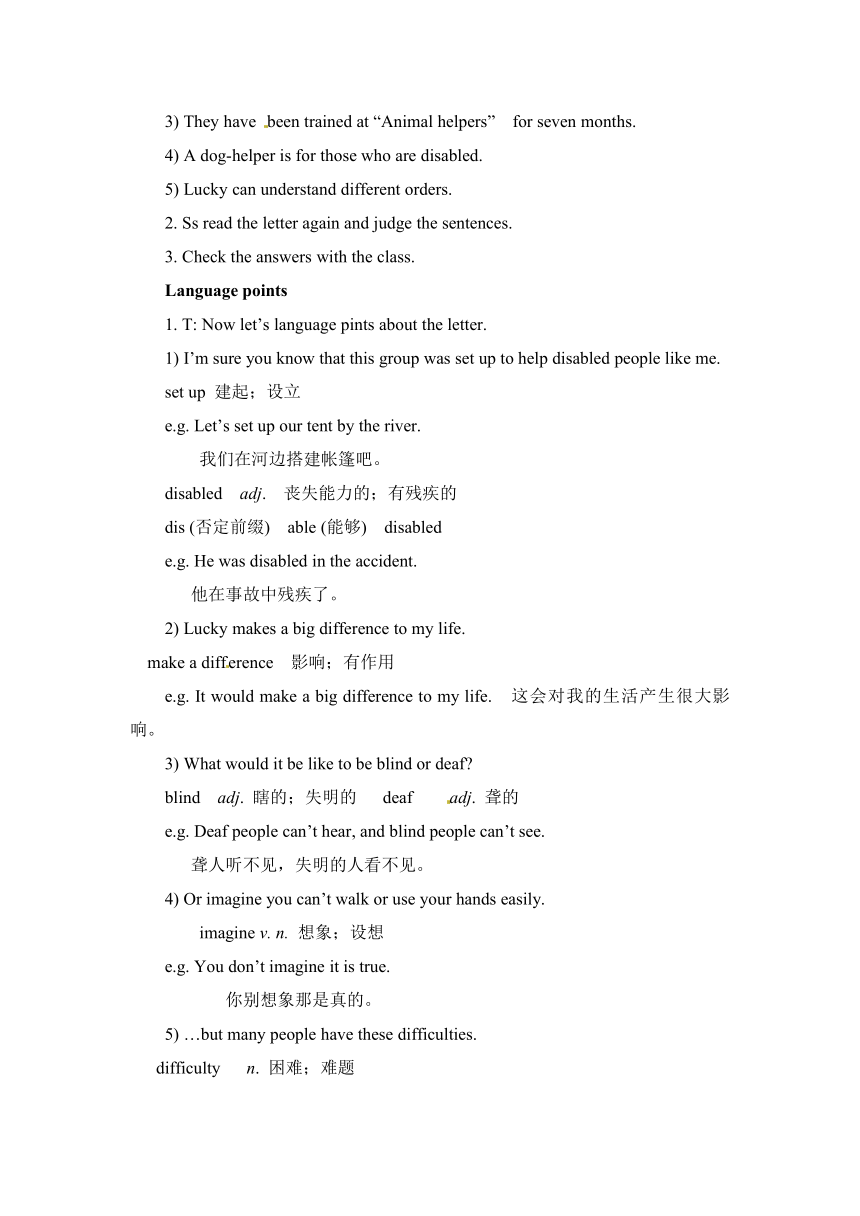人教版八年级下册 Unit 2 I'll help to clean up the city parks?SectionB 2a-2e 教案
文档属性
| 名称 | 人教版八年级下册 Unit 2 I'll help to clean up the city parks?SectionB 2a-2e 教案 |  | |
| 格式 | doc | ||
| 文件大小 | 48.0KB | ||
| 资源类型 | 教案 | ||
| 版本资源 | 人教新目标(Go for it)版 | ||
| 科目 | 英语 | ||
| 更新时间 | 2022-12-21 10:12:56 | ||
图片预览



文档简介
Unit 2 I’ll help to clean up the city park.
Section B 1 (2a-2e)
教材分析:
本单元的话题是"支援活动",内容贴近学生生活,是学生感兴趣的话题.本课时是一节阅读课,内容是现在所关注的焦点,内容简单,学生对话题很感兴趣,在本课时中将主要从阅读短文及练习来进一步掌握志愿活动,从而让学生喜欢上志愿活动,并乐意去做这些活动.
学情分析:
本单元的话题贴近学生生活,内容简单,且本课时的短语及句型都是学生很 熟知的,在此基础上完成本课时的学习是简单轻松的.
一、教学目标:
1. 语言知识目标:
1) 能掌握以下单词:repair, fix, give away, wheel, letter, miss, set up, make a difference, blind, deaf, imagine, difficulty, open, door, carry, train, excited, training, kindness, clever, understand, change, disabled
2) 能掌握以下句型:
① I’d like to thank you for giving money to Animal Helpers.
② I’m sure you know that this group was set up to help disabled people like me.
③ You helped to make it possible for me to have Lucky.
④ Lucky makes a difference to my life.
⑤ I’m only able to have a “dog-helper” because your kindness.
2. 情感态度价值观目标:
了解社会上有很多人需要我们的帮助,奉献爱心并不是要有多么伟大的壮举,而是首先自己要真正拥有一颗“爱心”,如此便可从身边的点点滴滴做起。
二、教学重难点
1. 教学重点:
1) 掌握本课时出现的生词及用法。
2) 进行听力训练,提高综合听说能力。
3) 阅读短文,获得相关信息,提高学生们的综合阅读能力。
2. 教学难点
1. 听力训练
2. 阅读2b部分的短文并完成相关要求。
三、教学过程
Step 1 Warming up and revision
1. Daily greeting.
2. 复习动词不定式的用法,并完成相关任务。
3. Check the homework. Let some Ss report “Who’s the … in class ”
Step 2 Warming up
1. T: Show some pictures of disabled people and their lives, for example, a blind man, some deaf girls. Tell Ss their life may be very difficult. They sometimes need our help.
2. Talk about the dog-helper. What can it do
e.g. A dog-helper can lead a blind man to many places. It can get the things a man wanted.
Step 3 Reading
Fast Reading
1. T: Now let’s work on 2b. First, let’s read the questions and make sure we know the meanings of all the questions. Then read the passage quickly and find the answers to the questions.
1) What kind of letter is it
2) Who wrote the letter to Miss Li Why
2. Ss read the letter quickly and try to find the answers to the two questions.
3. Check the answers with the class.
Careful Reading
1. T: Now let’s read these sentences about the letter. Read the passage again. Judge if the sentences are True or False. Please underline under the main sentences.
1) The writer can’t use her arms or legs well.
2) Lucky was brought to the writer by her friend.
3) They have been trained at “Animal helpers” for seven months.
4) A dog-helper is for those who are disabled.
5) Lucky can understand different orders.
2. Ss read the letter again and judge the sentences.
3. Check the answers with the class.
Language points
1. T: Now let’s language pints about the letter.
1) I’m sure you know that this group was set up to help disabled people like me.
set up 建起;设立
e.g. Let’s set up our tent by the river.
我们在河边搭建帐篷吧。
disabled adj. 丧失能力的;有残疾的
dis (否定前缀) able (能够) disabled
e.g. He was disabled in the accident.
他在事故中残疾了。
2) Lucky makes a big difference to my life.
make a difference 影响;有作用
e.g. It would make a big difference to my life. 这会对我的生活产生很大影响。
3) What would it be like to be blind or deaf
blind adj. 瞎的;失明的 deaf adj. 聋的
e.g. Deaf people can’t hear, and blind people can’t see.
聋人听不见,失明的人看不见。
4) Or imagine you can’t walk or use your hands easily.
imagine v. n. 想象;设想
e.g. You don’t imagine it is true.
你别想象那是真的。
5) …but many people have these difficulties.
difficulty n. 困难;难题
difficult adj. 困难的 difficulty n.
e.g. When you’re in difficulty, ask me for difficulty.
当你遇到困难时,向我求助。
6) …opening and closing doors,…
open v. 打开;开
e.g. Open the door, please. 请开门。
7) Helpers about getting me a special trained dog.
train v. 训练;培训
train v. training n. 训练;培训
e.g. I’m training myself for a race.
我正在为赛跑作训练。
Very hard training is necessary.
刻苦训练很必要。
8) I love animals and I was excited about the idea of having a dog.
excited adj. 激动的;兴奋的
辨析:exciting 与excited
exciting 意为“另人兴奋的”,常用于修饰事物;
excited 意为“激动的”,人作主语。
e.g. The boy was too excited to go to sleep. 小男孩太兴奋了,以至于不能入睡。
I have some exciting news for you. 我告诉你一些另人兴奋的消息。
9) Lucky is very clever and understands many English words.
clever adj. 聪明的
e.g. It was clever of him to find the way here.
他能找到这儿来真是聪明。
understand v. 理解;领会 (understood)
e.g. This grammar is easy to understand.
这本语法书很容易理解。
10) Thank you again for changing my life.
change v. 变化;改变
e.g. How did it change his life?
它如何改变他的生活?
2. Ss read and try to remember.
Post reading
Work on 2c
1. Now look at the list of words below. Circle the part of the speech of each word and make your own sentences with these words.
1) group (adj. / n. )
___________________________________
2) disabled (adj. / adv. )
__________________________________
3) difference (adv. / n. )
___________________________________
4) imagine (v. / n. )
__________________________________
5) difficulties (n. / adj. )
_________________________________
6) normal (adv. / adj. )
__________________________________
7). training (adv. / n. )
__________________________________
8) kindness (n. / v. )
__________________________________
2. Let some Ss circle the part of speech.
3. Ss try to make sentences with the words.
4. Let some Ss read their sentences and correct their mistakes.
5. Ss check the sentences with their partners.
Work on 2d
1. Tell Ss that they will use information in the letter to make true sentences by matching the different parts.
2. Ss work by themselves.
3. Check the answers together.
Step 4 Discussing
1. T: 1. In what other ways do you think dogs are able to help people
2. What other animals can we train to help people
2. Now talk about it with your partner.
3. Ask some Ss say what they answers.
Blackboard Design
Unit 2 I’ll help to clean up the city park.
Section B 1 (2a-2e)
① I’d like to thank you for giving money to Animal Helpers.
② I’m sure you know that this group was set up to help disabled people like me.
③ You helped to make it possible for me to have Lucky.
④ Lucky makes a difference to my life.
⑤ I’m only able to have a “dog-helper” because your kindness.
Section B 1 (2a-2e)
教材分析:
本单元的话题是"支援活动",内容贴近学生生活,是学生感兴趣的话题.本课时是一节阅读课,内容是现在所关注的焦点,内容简单,学生对话题很感兴趣,在本课时中将主要从阅读短文及练习来进一步掌握志愿活动,从而让学生喜欢上志愿活动,并乐意去做这些活动.
学情分析:
本单元的话题贴近学生生活,内容简单,且本课时的短语及句型都是学生很 熟知的,在此基础上完成本课时的学习是简单轻松的.
一、教学目标:
1. 语言知识目标:
1) 能掌握以下单词:repair, fix, give away, wheel, letter, miss, set up, make a difference, blind, deaf, imagine, difficulty, open, door, carry, train, excited, training, kindness, clever, understand, change, disabled
2) 能掌握以下句型:
① I’d like to thank you for giving money to Animal Helpers.
② I’m sure you know that this group was set up to help disabled people like me.
③ You helped to make it possible for me to have Lucky.
④ Lucky makes a difference to my life.
⑤ I’m only able to have a “dog-helper” because your kindness.
2. 情感态度价值观目标:
了解社会上有很多人需要我们的帮助,奉献爱心并不是要有多么伟大的壮举,而是首先自己要真正拥有一颗“爱心”,如此便可从身边的点点滴滴做起。
二、教学重难点
1. 教学重点:
1) 掌握本课时出现的生词及用法。
2) 进行听力训练,提高综合听说能力。
3) 阅读短文,获得相关信息,提高学生们的综合阅读能力。
2. 教学难点
1. 听力训练
2. 阅读2b部分的短文并完成相关要求。
三、教学过程
Step 1 Warming up and revision
1. Daily greeting.
2. 复习动词不定式的用法,并完成相关任务。
3. Check the homework. Let some Ss report “Who’s the … in class ”
Step 2 Warming up
1. T: Show some pictures of disabled people and their lives, for example, a blind man, some deaf girls. Tell Ss their life may be very difficult. They sometimes need our help.
2. Talk about the dog-helper. What can it do
e.g. A dog-helper can lead a blind man to many places. It can get the things a man wanted.
Step 3 Reading
Fast Reading
1. T: Now let’s work on 2b. First, let’s read the questions and make sure we know the meanings of all the questions. Then read the passage quickly and find the answers to the questions.
1) What kind of letter is it
2) Who wrote the letter to Miss Li Why
2. Ss read the letter quickly and try to find the answers to the two questions.
3. Check the answers with the class.
Careful Reading
1. T: Now let’s read these sentences about the letter. Read the passage again. Judge if the sentences are True or False. Please underline under the main sentences.
1) The writer can’t use her arms or legs well.
2) Lucky was brought to the writer by her friend.
3) They have been trained at “Animal helpers” for seven months.
4) A dog-helper is for those who are disabled.
5) Lucky can understand different orders.
2. Ss read the letter again and judge the sentences.
3. Check the answers with the class.
Language points
1. T: Now let’s language pints about the letter.
1) I’m sure you know that this group was set up to help disabled people like me.
set up 建起;设立
e.g. Let’s set up our tent by the river.
我们在河边搭建帐篷吧。
disabled adj. 丧失能力的;有残疾的
dis (否定前缀) able (能够) disabled
e.g. He was disabled in the accident.
他在事故中残疾了。
2) Lucky makes a big difference to my life.
make a difference 影响;有作用
e.g. It would make a big difference to my life. 这会对我的生活产生很大影响。
3) What would it be like to be blind or deaf
blind adj. 瞎的;失明的 deaf adj. 聋的
e.g. Deaf people can’t hear, and blind people can’t see.
聋人听不见,失明的人看不见。
4) Or imagine you can’t walk or use your hands easily.
imagine v. n. 想象;设想
e.g. You don’t imagine it is true.
你别想象那是真的。
5) …but many people have these difficulties.
difficulty n. 困难;难题
difficult adj. 困难的 difficulty n.
e.g. When you’re in difficulty, ask me for difficulty.
当你遇到困难时,向我求助。
6) …opening and closing doors,…
open v. 打开;开
e.g. Open the door, please. 请开门。
7) Helpers about getting me a special trained dog.
train v. 训练;培训
train v. training n. 训练;培训
e.g. I’m training myself for a race.
我正在为赛跑作训练。
Very hard training is necessary.
刻苦训练很必要。
8) I love animals and I was excited about the idea of having a dog.
excited adj. 激动的;兴奋的
辨析:exciting 与excited
exciting 意为“另人兴奋的”,常用于修饰事物;
excited 意为“激动的”,人作主语。
e.g. The boy was too excited to go to sleep. 小男孩太兴奋了,以至于不能入睡。
I have some exciting news for you. 我告诉你一些另人兴奋的消息。
9) Lucky is very clever and understands many English words.
clever adj. 聪明的
e.g. It was clever of him to find the way here.
他能找到这儿来真是聪明。
understand v. 理解;领会 (understood)
e.g. This grammar is easy to understand.
这本语法书很容易理解。
10) Thank you again for changing my life.
change v. 变化;改变
e.g. How did it change his life?
它如何改变他的生活?
2. Ss read and try to remember.
Post reading
Work on 2c
1. Now look at the list of words below. Circle the part of the speech of each word and make your own sentences with these words.
1) group (adj. / n. )
___________________________________
2) disabled (adj. / adv. )
__________________________________
3) difference (adv. / n. )
___________________________________
4) imagine (v. / n. )
__________________________________
5) difficulties (n. / adj. )
_________________________________
6) normal (adv. / adj. )
__________________________________
7). training (adv. / n. )
__________________________________
8) kindness (n. / v. )
__________________________________
2. Let some Ss circle the part of speech.
3. Ss try to make sentences with the words.
4. Let some Ss read their sentences and correct their mistakes.
5. Ss check the sentences with their partners.
Work on 2d
1. Tell Ss that they will use information in the letter to make true sentences by matching the different parts.
2. Ss work by themselves.
3. Check the answers together.
Step 4 Discussing
1. T: 1. In what other ways do you think dogs are able to help people
2. What other animals can we train to help people
2. Now talk about it with your partner.
3. Ask some Ss say what they answers.
Blackboard Design
Unit 2 I’ll help to clean up the city park.
Section B 1 (2a-2e)
① I’d like to thank you for giving money to Animal Helpers.
② I’m sure you know that this group was set up to help disabled people like me.
③ You helped to make it possible for me to have Lucky.
④ Lucky makes a difference to my life.
⑤ I’m only able to have a “dog-helper” because your kindness.
同课章节目录
- Unit 1 What's the matter?
- Section A
- Section B
- Unit 2 I'll help to clean up the city parks.
- Section A
- Section B
- Unit 3 Could you please clean your room?
- Section A
- Section B
- Unit 4 Why don't you talk to your parents?
- Section A
- Section B
- Unit 5 What were you doing when the rainstorm came
- Section A
- Section B
- Review of Units 1-5
- Unit 6 An old man tried to move the mountains.
- Section A
- Section B
- Unit 7 What's the highest mountain in the world?
- Section A
- Section B
- Unit 8 Have you read Treasure Island yet?
- Section A
- Section B
- Unit 9 Have you ever been to a museum?
- Section A
- Section B
- Unit 10 I've had this bike for three years.
- Section A
- Section B
